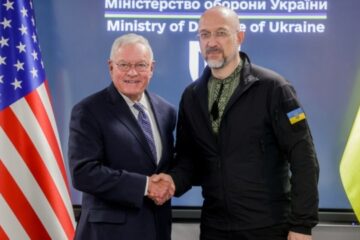Despite tough sanctions against the export of crude oil and petroleum products, Russia still earns up to $160 billion from fossil fuel exports annually. Why don’t sanctions work as intended?
Russian state oil and gas revenue is set to fall in July by around 37% from the same month in 2024 to 680 billion roubles ($8.66 billion) due to cheaper oil and a stronger local currency, Reuters has estimated. The decline in proceeds is painful for Russia, but this is still huge money, which the Kremlin is directing to the murder of Ukrainians. Overall, Russia’s oil and gas revenue for January-July could decline by 20% year-on-year to 5.4 trillion roubles. But if calculated in the US dollar equivalent ($70.2 billion), the drop is not that significant due to a decline in the value of U.S. dollar in relation to the Russian rouble. Though the world has long understood that tightening sanctions against Russian fossil fuel exports is one of the most effective ways to drain the aggressor’s war fighting capabilities, the previous rounds of sanctions have not caused a critical drop in the Kremlin’s revenues. Will the fresh package of sanctions announced by our partners in July help?
SANCTIONS TOUGHENING: A PAINFUL BUT NOT DEADLY BLOW TO RUSSIAN EXPORTS
The EU’s 18th package of sanctions against Russia, which was adopted on July 18, is targeting primarily Russia’s oil sector.
The new measures include asset freezes, limits on financial and shipping services, and bans on importing petroleum products that are refined from Russian oil, even if processed in third countries such as India.
The Oil Price Cap for crude oil has been lowered from 60 to 47.6 USD and an automatic and dynamic mechanism was introduced to set the future price cap for crude oil. The new price cap will apply on 3 September 2025. This will ensure that the cap level is always 15% lower than the average market price for Urals crude in the previous reference period. This system has been designed to make sure that the price cap is adjusted to the realities of oil markets and remains effective under all market conditions. The cap will be subject to regular review every 6 months by the Commission, as well as extraordinary reviews where duly justified by developments in the oil markets or other unforeseen circumstances.
The EU has listed 105 additional vessels of the Russian shadow fleet of oil tankers. These ships are attempting to evade the oil price cap, and engage in other unsafe shipping practices. These come in addition to the 342 vessels already sanctioned, bringing the total to 444. A listed vessel is subject to a port access ban, as well as a prohibition from receiving a broad array of maritime and other services. These include financing and financial assistance, including insurance and brokering flag registration, technical assistance, bunkering, ship supply services, crew changes services, and other services including cargo loading and discharge services, fendering and tug services. This means that such services cannot be provided by EU operators, in ports or outside of territorial waters.
фото
Asset freeze measures have been imposed on 18 entities located outside Russia, mainly in China, India, and the UAE, for their links to circumvention of restrictions on energy products and involvement in the Russian so-called shadow-fleet. Indian company Nayara Energy, which operates an important refinery and Vadinar that is 49%-owned by Rosneft are both included in the list of targeted entities.
Rosneft’s proposed sale of its 49.13% stake in Nayara Energy has hit a significant obstacle following the European Union’s latest round of sanctions targeting Russia’s oil sector. The sanctions have directly impacted Nayara’s operations and complicated Rosneft’s efforts to divest its interest in the company.
Rosneft has been exploring exit options from Nayara for some time, citing difficulties in repatriating dividends due to existing sanctions. The latest sanctions now cast serious doubt over Rosneft’s ability to proceed with the stake sale.
The new EU sanctions prohibit the import of refined oil products derived from Russian crude. This means a clampdown on refined product imports made from Russian crude that are processed abroad and delivered into the EU. This will prevent Russian crude oil from reaching the EU market in any form. Exceptions are provided for Canada, Norway, the United Kingdom, the United States of America, and Switzerland, that is countries applying substantially equivalent restrictive measures.
Transaction ban for Nord Stream 1 and 2: This means no EU operator can engage in any transaction regarding the Nord Stream pipelines. Any transaction related to the construction, operation, maintenance or use of these gas pipelines is now prohibited, including financing or related services. The full transaction ban exclusively applies to activities related to these gas infrastructure projects, without affecting entities involved in respect of operations unrelated to the two targeted projects. Exceptions are provided for, e.g. in relation to the execution of court orders, wind-down operations or maintenance required to avoid risks to the environment, safety or fishing. The previous exemption for imports of Russian crude oil via pipeline to the Czech Republic will end as of 1 July 2025 since the country has sufficiently diversified its sources of supply. It is recalled that Member States are to seek alternatives to Russian imports of crude so that imports thereof can be further restricted.
Meanwhile, the United Kingdom on July 21 imposed new sanctions on Russia’s so-called “shadow fleet”, targeting 135 oil tankers along with two Russian firms, shipping company Intershipping Services LLC and oil trader Litasco Middle East DMCC.
The oil tankers are critical to Russia’s energy and oil sectors, with the British government saying they form part of the fleet responsible for carrying $24 billion worth of cargo since the start of 2024.
In particular, Intershipping Services LLC’s is responsible for registering vessels under the Gabonese flag, enabling them to transport up to $10 billion worth of goods annually on behalf of the Russian state.
Sanctions were also imposed on Litasco Middle East DMCC for its continued role in shipping large volumes of Russian crude oil.
SANCTIONS REDUCE LOOPHOLES, BUT DO NOT CHANGE THE OVERALL RULES OF THE GAME
According to energy expert Hennady Riabtsev, the latest package of sanctions does not add anything fundamentally new to the current restrictions regime. However, they reduce the number of loopholes used by Russian exporters to circumvent sanctions.
“The 18th EU package, for example, imposes sanctions against 105 more oil tankers, bringing the total to over 400. But American investigators estimate the total number of vessels transporting Russian oil at 900… And the restrictions introduced with respect to the provision of logistics, insurance, and financial services to Russian counterparties, which we refer to as “oil price caps,” affect primarily European companies rather then players from third countries,” the expert said in a comment to Ukrinform.
Фото Hennady Riabtsev
The expert assesses that a full-fledged restriction on energy imports from Russia will take some time to produce a tangible effect as the EU is planning a total ban on Russian oil and gas imports for as late as by the end of 2027. Therefore, in the short term, there should be no expectation of any noticeable effect unless oil prices drop significantly. And only such a drop, according to Riabtsev, will hit a really painful blow to Russia’s ability to finance its war on Ukraine.
As explained by the analyst, the effect from the sanctions currently in effect is not very noticeable yet, because they affect no more than 43-45% of Russian exports. Russia has the opportunity to redirect certain extracted resources to other regions for consumers who have not joined the international sanctions regime.
“In addition, sanctions will have a significant impact only if quotations on the global oil market fall to a level that corresponds to the real ratio between demand and supply. Currently, due to the previous policy of OPEC and OPEC+ member states, these quotations are overstated by at least a third. However, if the OPEC’s current policy, which replaced the previous one, is implemented, sanctions will become much more effective in the near future. According to the new policy, the cartel member states are planning to increase oil production in order to oust exporters with higher production costs from the market,” Riabtsev said.
The list of the countries with high production costs includes, in particular, Venezuela, certain African countries (Nigeria among them), and even some companies from the United States. But, most importantly, the Russian Federation. If this idea works, then increasing supply to the market, which already has a surplus of oil, will cause a decrease in quotations to USD 40-50 per barrel of Brent crude (approximately USD 30-40 for Russian Urals, respectively). The expert believes that this will open the way to achieving a significant effect from sanctions imposed by the EU, the British Commonwealth and the United States against Russian exporters.
фото Agia Zagrebelska
Agia Zagrebelska, Director of Partnership Development at the NGO Economic Security Council of Ukraine (ESCU), regards the 18th sanctions package to be a powerful and courageous step by European partners. After all, until recently there were doubts that it would be possible to adopt it in this form. In addition to persistent opposition from Hungary and Slovakia, Malta expressed fears about the impact of restrictions on its own shipowners. In addition, Europe risks facing an increase in diesel fuel prices.
“Fifteen percent of the European diesel fuel market comes from India and Turkey. Both countries are the biggest byers of cheap Russian oil,” Zagrebelska said as a reminder.
фото
Vyacheslav Butko, economic advisor to the Kyiv Security Forum, shares the view that, despite the possibility of circumventing sanctions, lowering the price cap and expanding the blacklist of shadow fleet tankers will gradually undermine the aggressor’s financial capabilities and reduce the number of those willing to cooperate with it.
“The Russian Federation is going to encounter problems caused by a reduction in its oil exports and a further decline in budget revenues, which are already decreasing due to falling world prices,” the expert says.
фото Vyacheslav Butko / photo via Facebook
He suggests the next steps to make sanctions more effective:
● a ban on passage through European straits (Denmark, the Baltics, Gibraltar, etc.) without insurance from a reliable insurer that has no ties to Russia;
● approval of a strict schedule for a gradual reduction in price caps;
● creation of “white lists” of Russian oil buyers, who will be obliged to transfer part of the profits from operations to Ukraine.
US President Donald Trump said earlier this month that Washington could impose 100% tariffs on buyers of Russian oil, along with other sanctions, if Moscow refuses to agree to a peace deal with Ukraine. The deadline for the ultimatum expires in early September.
Of course, it is too early to sell the “sanctions bear’s” skin before you’ve killed it. Many experts are warning that the American administration may change its stance more than once by then. But if implemented, such measures can really scale up the negative consequences for the aggressor.
Meanwhile, U.S. Energy Secretary Chris Wright said the introduction of secondary tariffs against buyers of Russian oil to help end the war in Ukraine is a “very real possibility”.
“It is huge pressure on Russia,” Wright said in an interview on Fox News.
That being said, the potential effect from secondary sanctions is hard to predict pending official approval by the U.S. Administration and clarification of the implementation mechanism.
“First of all, it is yet unknown what exactly the American president means by the promised sanctions. For example, he has recently signed an executive order that aims to reduce high prescription drug prices inside the United States, claiming prices would fall “almost immediately, by 30% to 80%”. But experts are highly sceptical of the claims, and stock market moves indicate that investors think they will have little immediate effect. “It is therefore unworthy for a potential effect from these sanctions to be assessed now, without knowing their content,” the expert argues.
фото Photo via freepik
Agia Zagrebelskaya additionally advises waiting for the official announcement and only then drawing conclusions: “We already know how the sanctions against the Russian shadow fleet and price caps are working, and how Russia circumvents them. But the sanctions against the Indian refinery are still “uncharted waters” for the market, especially considering that Rosneft is currently negotiating market-value sale of its stake in the refinery to the Indian company Reliance, owned by billionaire Mukesh Ambani. Not only is this the largest oil refining business in India, but also the largest consumer of Russian oil in that country. It is yet unclear whether Reliance will conclude the deal or even risk it at all.”
A positive signal is that, even pending the official announcement of secondary sanctions, India, one of the biggest importers of Russian oil with a share of 35 percent of overall imports, is active seeking alternative sources for oil supplies.
India is confident of meeting its oil needs from alternative sources if Russian supplies are hit by secondary sanctions, Oil Minister Hardeep Singh Puri has said.
India should be able to deal with any problems with Russian imports by seeking supplies from other countries, with potential alternative sources including new suppliers, in particular Guyana, as well as traditional exporters, Brazil, and Canada among others, he said, adding, “India has diversified the sources of supply and we have gone, I think, from about 27 countries that we used to buy from to about 40 countries now.”
Despite the positive dynamics, Hennady Riabtsev is cautious about the prospects for promised secondary sanctions being imposed on Indian and Chinese companies:
“In the context of the negotiations the U.S. administration is currently conducting with the governments of those countries, the introduction of any additional sanctions – and even more so their inclusion in trade agreements – is unlikely to be envisaged. Therefore, even if new tariffs are introduced from September, it is unlikely their level will correspond to the one previously announced by the U.S. president.”
SANCTIONS vs DIPLOMACY
Hugo Dixon, Commentator-at-Large for Reuters, believes that Donald Trump does not need so-called secondary tariffs to crush Russia’s oil revenues, currently running at $160 billion a year. The U.S. president’s recent threat to sanction countries that buy oil from Moscow is full of pitfalls. He has a better way to cut the cash flow that fuels the Kremlin’s war against Ukraine.
This would be to persuade India, Russia’s second biggest customer, to stop buying its oil while convincing Saudi Arabia to pump more. Doing so would ensure global crude prices do not jump as Moscow’s exports fall. The U.S. could also effectively slash the price that Russia gets for its foreign oil sales – going even further than the cut the European Union agreed last week. Together these measures would heap more trouble on President Vladimir Putin’s economy, which is already facing strains from a mounting budget deficit, slowing growth, rising bad debts and still high inflation.
Such blanket secondary tariffs would have so many drawbacks that financial markets do not believe Trump will carry out his threat. Russian equities and the rouble rose after his comments, while the crude price fell – exactly the opposite of what would have happened if investors thought he was serious.
Another problem is China, which bought almost a third of Russia’s crude exports by volume from January to May. Beijing is Moscow’s most important ally. So if Trump slapped 100% tariffs on Chinese imports into the United States, he probably would not change its behavior. He would merely further inflame a trade war with the world’s second largest economy and push up inflation at home.
Fortunately, there are alternatives. Trump could use carrots as well as sticks to persuade India and Turkey to stop buying Russian oil. Washington has extensive relationships with New Delhi and Ankara on defense, trade, technology and energy. By using multiple levers, Trump could craft win-win deals with both countries.
One carrot could be to secure alternative supplies of crude oil to global markets. This would reassure India and Turkey that they would not be paying more for their energy. It would also protect U.S. consumers from higher fuel prices.
The U.S. president’s first ports of call should be Saudi Arabia and the United Arab Emirates, as he has close relations with their leaders. They have excess oil production capacity of 3.2 million, opens new tab barrels a day between them, IEA data shows, which is more than what India and Turkey buy from Russia. Both are keen to increase their share of the global market.
Trump might also be able to persuade U.S. producers, with whom he has good relations, to ramp up oil production. If there was a temporary shortfall in the market, the United States could even release oil from its strategic reserves. It could commit to refill that stockpile as new production came onstream, giving drillers confidence to increase supply, Hugo Dixon argues.
The sanctions pressure is gradually ramping up on Russia, but its effectiveness still depends on the determination and coordination among Ukraine’s partners. A synergy of economic leverage, price restrictions, and diplomatic efforts is currently the only viable scenario for deterring the aggressor, who has not been stopped either by 18 packages of sanctions nor a fall in state revenues, which are still sufficient for Moscow to continue its was on Ukraine.
Vladyslav Obukh, Kyiv
Headline photo via freepik
Source: FRESH EU’S SANCTIONS AGAINST RUSSIA: TIGHTENING THE SCREWS OF EXISTING PROHIBITIONS




